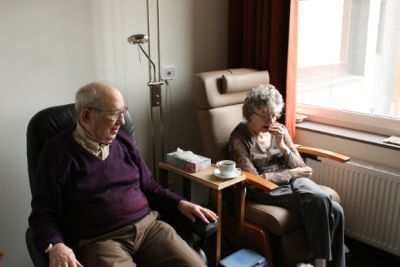How To Get Old Without Getting Stressed

Retirement and getting older is a unique phase of life that is viewed differently by different people. For many, it is the beginning of a new, relaxed life, where there is no work-related stress, no peer pressure, no worries about proving yourself or living up to others’ expectations.
On the other hand, many view retirement as the start of a much more difficult and stress-filled phase of life. They worry about financial resources, poor health, and the fear of losing relationships.
In view of this, it would not be wrong to say that stress is a part of everyone’s life. There are different stress triggers for different people and during different stages of life and it is almost impossible to completely eliminate it. However, this does not mean one has to spend all his or her life worrying about one thing or the other.
What’s The Way Out Then?
The key to living a happy and fun-filled life is to learn to manage stress. While learning techniques and secrets for stress management are important for everyone, it is especially crucial for the elderly. This is because as humans grow old, they do not get weak only physically, but emotionally as well.
Since stress is harmful to both emotional and physical health, elderly people being physically weaker naturally become more susceptible to suffer from the negative effects of stress.
If you want to sail through the later years of living happily, try not to give in to stress, although that is always a lot easier said than done. Mindfulness and meditation are excellent techniques to help you learn to cope with negative thoughts and feelings.
Effective Stress Management Tips
Following are some of the qualities/habits found common among the ‘successful agers’ for reducing or managing stress:
#1 Save For Your Retirement Age
Start thinking about your retirement when it is still far away. Manage your finances in such a way that you will be able to finance yourself in the old age with your own savings. Also, plan for your final expenses; such as medical treatments that you may need in case of any health issue and even for the expenditures of your death.
Death is an undeniable fact so rather than freaking out over the idea, plan for it as you plan for all other phases of life.
Taking an insurance plan that covers emergencies and death expenditures is a great way to make sure you won’t burden anyone even when you depart from this world. Remember, having a will won’t necessarily protect your loved ones from having to use a probate attorney, but it will be helpful.
#2 Stay Connected To Your Loved Ones
Nothing could affect your health and mood as positively as regular interactions with your loved ones. Since the elderly usually get withdrawn from their family and friends as they grow old, they inevitably fall prey to stress.
Find ways to stay in touch with the people that make you happy. If you are unable to visit them because of physical constraints, invite them to your place or talk to them via phone or video chat.
#3 Have a Pet
Keep a pet to stay busy and fill your life with joy and happiness. Dogs are considered as the best pets for the elderly due to the fact that if properly trained, they even protect their owners.
Also, dog care is relatively easy. However, if you do choose to get a furry companion, make sure it is one that is manageable, particularly as you do get older and less mobile. You may want to look into dog-walking services to give you a hand.
#4 Maintain Your Independence
This is important to keep the stress at bay. Nothing could be as stressful as the realization that you are totally dependent on others, even for small daily tasks. Even if you have physical limitations and cannot move freely, try to do your basic daily tasks yourself.
Multiple aids for the elderly are now available in the market to increase mobility and independence. For example, walking sticks, different types of handles (to be installed at different places throughout the house to help in walking, sitting and standing up) and other aids are available to minimize tripping hazards, most common among elderly.
Of course, it does sometimes get to the point where one is unable to do this and if that is the case, do not feel ashamed.
#5 Choose the Right Living Environment
Where you live plays a significant role in your overall happiness and well-being. A comfortable and supportive environment can help reduce stress, while an unsuitable living situation can lead to feelings of isolation or anxiety.
As you age, consider factors such as accessibility, community engagement, and available support services when making decisions about your home. Taking the time to explore your options and finding ideal senior living arrangement can help ensure a space that meets both your current and future needs, offering peace of mind and a sense of belonging.






